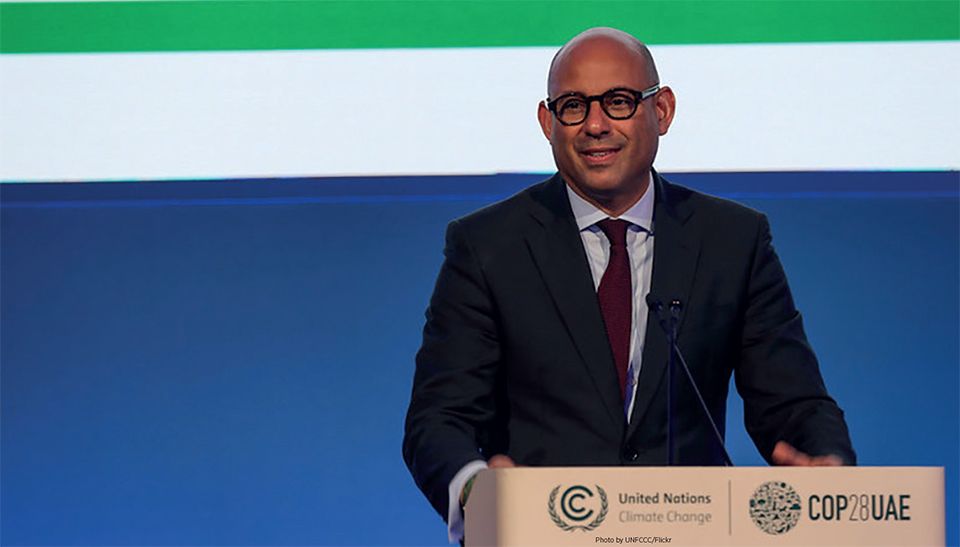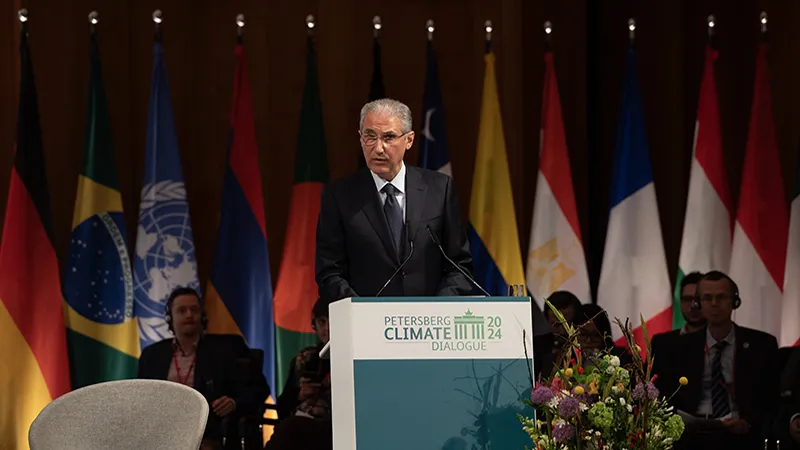“Finance is a great enabler of climate action,” said UN climate change executive secretary Simon Stiell as he kicked off Finance Day, which included a series of pledges for the Green Climate Fund, commitments from international banks and support for debt relief for vulnerable countries.
Here’s ESG Clarity‘s round-up of the key announcements:
Green Climate Fund sees record funding
The Green Climate Fund saw a further $3.5bn in pledges at COP28 from five different nations meaning the amount pledged over the next four years is now at $12.8bn, a record level.
It follows the $9.3bn committed at the High-level Pledging Conference in Bonn in October where 25 countries pledged their support to form the second replenishment of the fund.
At COP28 Estonia, Italy, Portugal, Switzerland and the US all committed bringing the total number of countries involved to 30.
Speaking at the Green Climate Fund event, Stiell (pictured) said: “The simple idea behind the Green Climate Fund is among the best, critical ideas we have had in the fight against climate change. Finance is the great enabler of climate action. Providing grant funding for developing countries can get both mitigation and adaptation projects off the ground.
“It builds momentum. It leverages grant funding to multiply its impact. It helps developing countries build ambition into their Nationally Determined Contributions and their National Adaptation Plans.”
He highlighted one example as the $250m investment for the Infrastructure Climate Resilient Fund, which he said can benefit up to 144 million people with “reliable, resilient, and clean infrastructure across Africa” when it reaches its potential.
However, Stiell called on more countries to back the fund: “I am delighted about the latest pledges announced here at COP28. It has brought the total replenishment pledges to 12.5 billion dollars.
“But the fund is still nowhere near being at a size proportional to the high-quality demand coming from developing countries.
“That means a wider pool of contributors. For too long we’ve relied on a small group of countries to provide the bulk of funding.
“More countries should see it in their interest to contribute. It will be a contribution to our shared future. To our shared prosperity.”
MDBs pledge billions for sustainable projects
Multilateral Development Banks (MDBs) united to announce commitments they said will unlock $180bn in climate finance, while also unveiling plans to develop a common approach for reporting climate results.
The Inter-American Development Bank (IDB) announced at COP28 it will triple its climate lending to $150bn over the next decade, while the World Bank committed to increase its climate finance target to 45% by 2025, unlocking an additional $9bn a year.
Specifically, the IDB also announced $5bn in additional financing for sustainable development projects in the Amazon, and $1bn equivalent of incentives for countries to meet climate and nature targets through discounts on loans if targets are met.
The World Bank said its increased climate target would mean $40bn in climate finance annually by 2025, of which $9bn per year for the next two years is additional. It also pledged a further $5bn to support 100 million people in Africa with clean energy access over the next seven years.
Meanwhile, the Islamic Development Bank committed $1bn to support adaptation in conflict affected countries, and the African Development Bank launched a $175m facility for green infrastructure in Africa, as well a $1bn facility to provide insurance against climate impacts to over 40 million farmers across Africa.
“MDBs and the IMF will have to play a key role in the implementation of the Global Climate Finance Framework launched by UAE along with key world leaders,” said his excellency Mohamed Al Hussaini, UAE minister of state for financial affairs. “During COP28, we have seen some good announcements from MDBs, on more ambitious climate finance targets. These are all good steps, in the right direction. We must now move ahead, with even more momentum and ambition.”
Climate debt clauses for vulnerable countries
Finance Day also saw international financial institutions commit to make adjustments to the way they lend to support vulnerable countries tackling climate change.
The UK, France, World Bank, Inter-American Development Bank (IDB), European Investment Bank (EIB), European Bank for Reconstruction and Development (EBRD) and African Development Bank (AfDB) all announced new commitments to expand climate-resilient debt clauses (CRDCs) in their lending to allow debt service to be paused to provide breathing space when countries are hit by climate catastrophes.
For example, the UK announced the first ever climate resilient debt clause to Senegal, the first in Africa, while the World Bank announced it will start offering CRDCs in existing loans, which will pause debt as well as interest for two years in the event of a natural disaster, and the organisation has committed to covering all transaction costs.
“By delivering new CRDCs in Senegal and Guyana, the UK is allowing affected communities to temporarily pause debt repayments in the wake of a climate disaster, giving them breathing space to recover”, said Andrew Mitchell, UK minister for development, at the event.
Credit rating agencies such as Fitch Ratings also indicated at COP28 that it is looking into considering revisions to credit rating criteria to ensure use of CRDCs does not impose a burden for borrower countries.
Call for Collaboration
The Institutional Investors Group on Climate Change (IIGCC) was among a number of organisations involved in a ‘Call for Collaboration’ encouraging governments to accelerate efforts around mobilising private finance for adaptation and resilience.
A written statement said private financial institutions are investing in adaptation and resilience, and implementing the necessary financial instruments, frameworks, and metrics, but said “yet action is incremental and requires the development of further enabling conditions”.
The partners behind the Call, including the IIGCC, UN Environment Programme Finance Initiative (UNEP FI), the University of Oxford Environmental Change Institute, the University of Cambridge Institute for Sustainability Leadership, and the Asia Investor Group on Climate Change, committed to sharing knowledge, data and best practices as well as pilot frameworks and taxonomies.
Blended finance vehicle launched by Nordics and US
In the Blue Zone yesterday at COP28, Nordic countries and the US launched a new blended finance collaboration aimed at mobilising billions of dollars for developing countries and emerging markets. It will direct private capital for investments into climate mitigation and adaptation, biodiversity and nature-based solutions before the end of 2025, a statement said.
With the World Climate Foundation acting as the operating partner, and with support from the Climate Investment Coalition, the Investment Mobilisation Collaboration Arrangement (IMCA) will engage with asset managers on blended finance investments and with asset owners for financial pledges. It is seeking to raise $500m in private capital for climate adaptation with a particular focus on Africa.
The statement also said conversations with other potential donor countries are ongoing and the initiative welcomes new partners.
COP28 president doubles down on the science
Following controversial comments at the weekend, where COP28 president Sultan Al Jaber questioned the science behind phasing out fossil fuels, he used Finance Day to reiterate the host nation’s position and said “everything this presidency has been working on, and continues to work on, is centred around the science”.
On Sunday, Al Jaber said there is “no science” in proving phasing out fossil fuels would limit warming from climate change to 1.5C, and it also would not allow sustainable development “unless you want to take the world back into caves”.
In a press conference in Dubai, he said: “We’re here because we very much believe and respect the science.”
Al Jaber also highlighted $57bn had been mobilised in new pledges and commitments in the first four days of COP28.
Hortense Bioy, global director of sustainability research for Morningstar and ESG Clarity Committee member, commented: “It’s a shame that the war of narratives and language on the future of fossil fuels overshadowed the Finance Day agenda because many positive initiatives were announced, such as the UAE Banking Federation’s collective pledge to mobilize nearly $270bn by 2030. Another positive announcement by the UK, France, the World Bank, and other development banks is their decision to pause debt when countries are hit by natural disasters. This ties in nicely with the loss and damage fund.”





